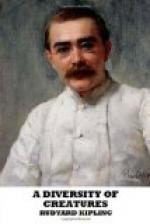And when Fate threw Miss Fowler’s nephew, an unlovely orphan of eleven, on Miss Fowler’s hands, Mary Postgate stood to her share of the business of education as practised in private and public schools. She checked printed clothes-lists, and unitemised bills of extras; wrote to Head and House masters, matrons, nurses and doctors, and grieved or rejoiced over half-term reports. Young Wyndham Fowler repaid her in his holidays by calling her ‘Gatepost,’ ‘Postey,’ or ‘Packthread,’ by thumping her between her narrow shoulders, or by chasing her bleating, round the garden, her large mouth open, her large nose high in air, at a stiff-necked shamble very like a camel’s. Later on he filled the house with clamour, argument, and harangues as to his personal needs, likes and dislikes, and the limitations of ‘you women,’ reducing Mary to tears of physical fatigue, or, when he chose to be humorous, of helpless laughter. At crises, which multiplied as he grew older, she was his ambassadress and his interpretress to Miss Fowler, who had no large sympathy with the young; a vote in his interest at the councils on his future; his sewing-woman, strictly accountable for mislaid boots and garments; always his butt and his slave.
And when he decided to become a solicitor, and had entered an office in London; when his greeting had changed from ’Hullo, Postey, you old beast,’ to Mornin’, Packthread,’ there came a war which, unlike all wars that Mary could remember, did not stay decently outside England and in the newspapers, but intruded on the lives of people whom she knew. As she said to Miss Fowler, it was ‘most vexatious.’ It took the Rector’s son who was going into business with his elder brother; it took the Colonel’s nephew on the eve of fruit-farming in Canada; it took Mrs. Grant’s son who, his mother said, was devoted to the ministry; and, very early indeed, it took Wynn Fowler, who announced on a postcard that he had joined the Flying Corps and wanted a cardigan waistcoat.
‘He must go, and he must have the waistcoat,’ said Miss Fowler. So Mary got the proper-sized needles and wool, while Miss Fowler told the men of her establishment—two gardeners and an odd man, aged sixty—that those who could join the Army had better do so. The gardeners left. Cheape, the odd man, stayed on, and was promoted to the gardener’s cottage. The cook, scorning to be limited in luxuries, also left, after a spirited scene with Miss Fowler, and took the housemaid with her. Miss Fowler gazetted Nellie, Cheape’s seventeen-year-old daughter, to the vacant post; Mrs. Cheape to the rank of cook, with occasional cleaning bouts; and the reduced establishment moved forward smoothly.




